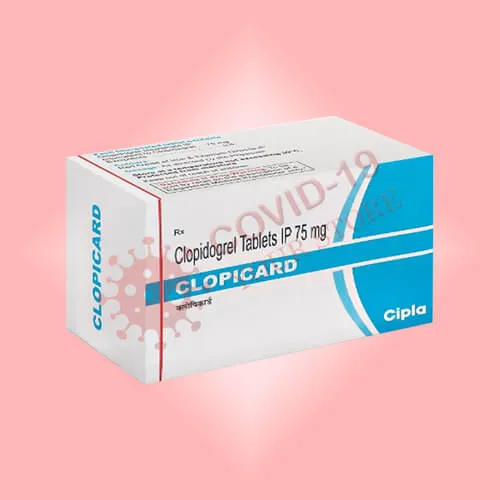What is Clopidogrel (Clopicard 75 mg)?
Clopidogrel (Clopicard 75 mg), marketed under the brand name Clopicard, is an antiplatelet medication used to prevent blood clots in individuals at risk for heart attack, stroke, and other cardiovascular conditions. It belongs to a class of drugs known as thienopyridines, which work by inhibiting platelets in the blood from sticking together, preventing the formation of harmful clots.
Clopidogrel is commonly prescribed for patients with a history of heart disease, stroke, or peripheral artery disease (PAD). It is often prescribed alongside other medications as part of a comprehensive treatment plan to reduce the risk of cardiovascular events.
How Does Clopidogrel (Clopicard 75 mg) Work?
Clopidogrel works by blocking a receptor on the surface of platelets, called P2Y12, which is essential for platelets to activate and stick together. By inhibiting this receptor, Clopidogrel prevents platelets from clumping together to form clots, which can lead to dangerous health conditions such as heart attack or stroke.
This mechanism helps reduce the risk of thrombotic events, including acute coronary syndrome, ischemic stroke, and peripheral vascular disease.
Benefits of Clopidogrel (Clopicard 75 mg)
- Reduces Risk of Heart Attack and Stroke: It prevents the formation of blood clots, which are major contributors to heart attacks and strokes.
- Prevents Thrombotic Events: Helps prevent complications related to conditions such as angina, peripheral artery disease, and after heart surgery.
- Post-Surgical Benefits: Often used after coronary artery bypass graft (CABG) or stent placement to prevent clotting and ensure proper blood flow.
- Enhances Antiplatelet Therapy: Works effectively when combined with aspirin for a more robust approach to cardiovascular health.
How to Take Clopidogrel (Clopicard 75 mg)
- Dosage: The typical dose is 75 mg per day, but it may vary depending on the patient’s medical condition and doctor’s instructions.
- Administration: Take Clopidogrel with or without food. Swallow the tablet whole with water. Do not crush or chew the tablet.
- Missed Dose: If you miss a dose, take it as soon as you remember. However, if it’s almost time for your next dose, skip the missed dose. Never take two doses at once to make up for a missed dose.
- Consistency: Take Clopidogrel at the same time each day to help remember.
Who Manufactures Clopidogrel (Clopicard 75 mg)?
Clopidogrel (Clopicard 75 mg) is manufactured by Cadila Healthcare, a leading pharmaceutical company known for producing a range of medicines for various health conditions. Always buy from a licensed and reputable source to ensure the quality and authenticity of the medication.
Is Clopidogrel (Clopicard 75 mg) Safe for Humans?
Clopidogrel is generally considered safe for most people when used as prescribed. However, like any medication, it can have risks, especially when used inappropriately or in certain medical conditions.
Precautions:
- Pregnancy and Breastfeeding: Consult your doctor before using Clopidogrel if you are pregnant or breastfeeding.
- Pre-existing Conditions: If you have a history of bleeding disorders, active bleeding, liver disease, or a recent surgery, inform your doctor before starting this medication.
- Drug Interactions: Clopidogrel may interact with other medications like warfarin, NSAIDs, and certain antidepressants, so your doctor should review all your current medications.
Possible Side Effects of Clopidogrel (Clopicard 75 mg)
While Clopidogrel is effective, it may cause some side effects:
- Common Side Effects: Nausea, diarrhea, or stomach pain.
- Serious Side Effects: Unusual bleeding, including nosebleeds, gum bleeding, or internal bleeding.
- Severe Reactions: Rare cases of thrombotic thrombocytopenic purpura (TTP) or severe allergic reactions.
- Long-Term Effects: Prolonged use can increase the risk of gastrointestinal bleeding.
If you notice any symptoms of bleeding or bruising, contact your healthcare provider immediately.
Disclaimer
This content is intended for informational purposes only and should not be used as a substitute for professional medical advice. Always consult your healthcare provider before starting, stopping, or altering your medication. Incorrect use of Clopidogrel may cause severe health risks, including life-threatening bleeding.









